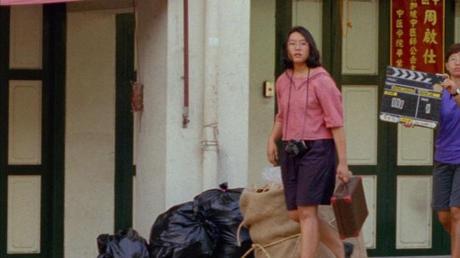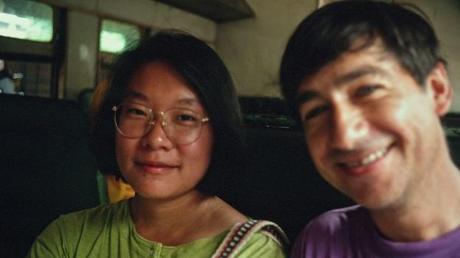In early 1990s Singapore, the wildly ambitious and rebellious Sandi Tan and her friends made a movie called with the help of a local film school teacher named George Cardona. It involves Tan playing a teenage serial killer who gathers a bit of an oddball posse of disaffected youth and then kills most of them by simply pointing her finger and pulling an imaginary trigger. They shot it over summer and left it to Cardona to edit together. Then, for reasons unknown, Cardona stole all of the film cans and disappeared into the night. Shirkers, the documentary, is the story of how they finally got their movie back decades later and what the passage of time has done to their friendship.
Or, more accurately, it's largely the story of how awesome Sandi Tan is and how horrible, yet beguilingly mysterious George Cardona is.

If that's all there was to Shirkers it would be a historical curiosity - they made a movie which would have been hugely important to Singapore film history - yet a tad insufferable. An adult Sandi Tan narrates both the making of the original Shirkers and her quest to find Cardona as if she's reading from her own teenage diary and not at all interested in critiquing her old punk rock view of the world, one where she's clearly amazing and everyone else is just in her way. Even when she describes going on a seriously ill-advised road trip through America with Cardona even though she was a teenager and he was twice her age and married, it's tough to tell from her tone if she now looks back on it as "What was I thinking?" or "Fuck yeah I did it, because everyone told me not to!"
Is Tan still the girl who wrote the screenplay for a proto-surrealistic Slackers/Rushmore/Ghost World kind of movie AND then played the lead character even though she couldn't act or has time seasoned and wisened her? For the majority of Shirkers, you can't quite tell. You just know she once made a movie in a place where few films had ever been made and then had her voice silenced by an insecure man who had a thing for first enabling talented artists around him before stealing their work and hoarding it away for no one else to see. As Tan discovers through her detective work, she wasn't Cardona's only victim nor was Shirkers the only project he self-sabotaged.

The experience shattered Tan so much back then that she escaped inward and became a self-described terrible film critic for a Singapore newspaper while her old Shirkers co-conspirators took it more in stride and moved on to making other movies or teaching at university. Now Tan has attended film school and amassed a couple of credits, and while Shirkers starts out as a love letter to herself and revenge on Cardona it eventually turns self-reflective.
"You were an asshole!" offers one old friend (pictured below) and Shirkers co-creator, in a tone which suggests she's waited years to say that. Tan's recollection of making Shirkers movie differs from that of her friends, most of whom worked behind the scenes. They were all far more suspicious of Cardona than her and felt a little abandoned since she was so drunk off of getting to make her own movie she turned a blind eye to so many obvious problems.
Interviewed now, you can see how Tan is still trying to steamroll over them and command the conversation. When they push back on her version of events, it takes the adult Tan a while to realize they might be right. "Oh, God, I AM an asshole!" she observes later on while narrating footage of herself attempting to take complete control of the friend/camerawoman hired to film her wedding. It's in these moments when Tan's attempt to frame the narrative around her own rosy view of her rebellious youth is actually challenged by old friends that Shirkers elevates itself into a truly captivating work of introspection.
Shirkers, inherently, is loud and proud with its feminism since perseverance allows these women to finally prevail over a pathetic man determined to stand in their way. They were all victimized by a mentor with a vampiric need to feed upon their artistic ambition and promising careers. As such, Shirkers is a very now kind of documentary, another female excavation of what could have been were it not for some asshole dude in power.
It's perhaps inevitable, then, that Tan grew to romanticize the time before Cardona robber her of a future. Through Shirkers, she gets her cinematic revenge on him, but in chasing after that girl she used to be she's forced into some harsh realizations and conversations she's clearly long avoided. It's a truly fascinating journey to behold.
THE BOTTOM LINEGeorge Cardona begins and ends the documentary as an unknowable figure, but it's Sandi Tan's journey of self-discovery which truly makes Shirkers a must-watch.
What's your take on Shirkers? Let me know in the comments.
Grew up obsessing over movies and TV shows. Worked in a video store. Minored in film at college because my college didn't offer a film major. Worked in academia for a while. Have been freelance writing and running this blog since 2013. View all posts by Kelly Konda

